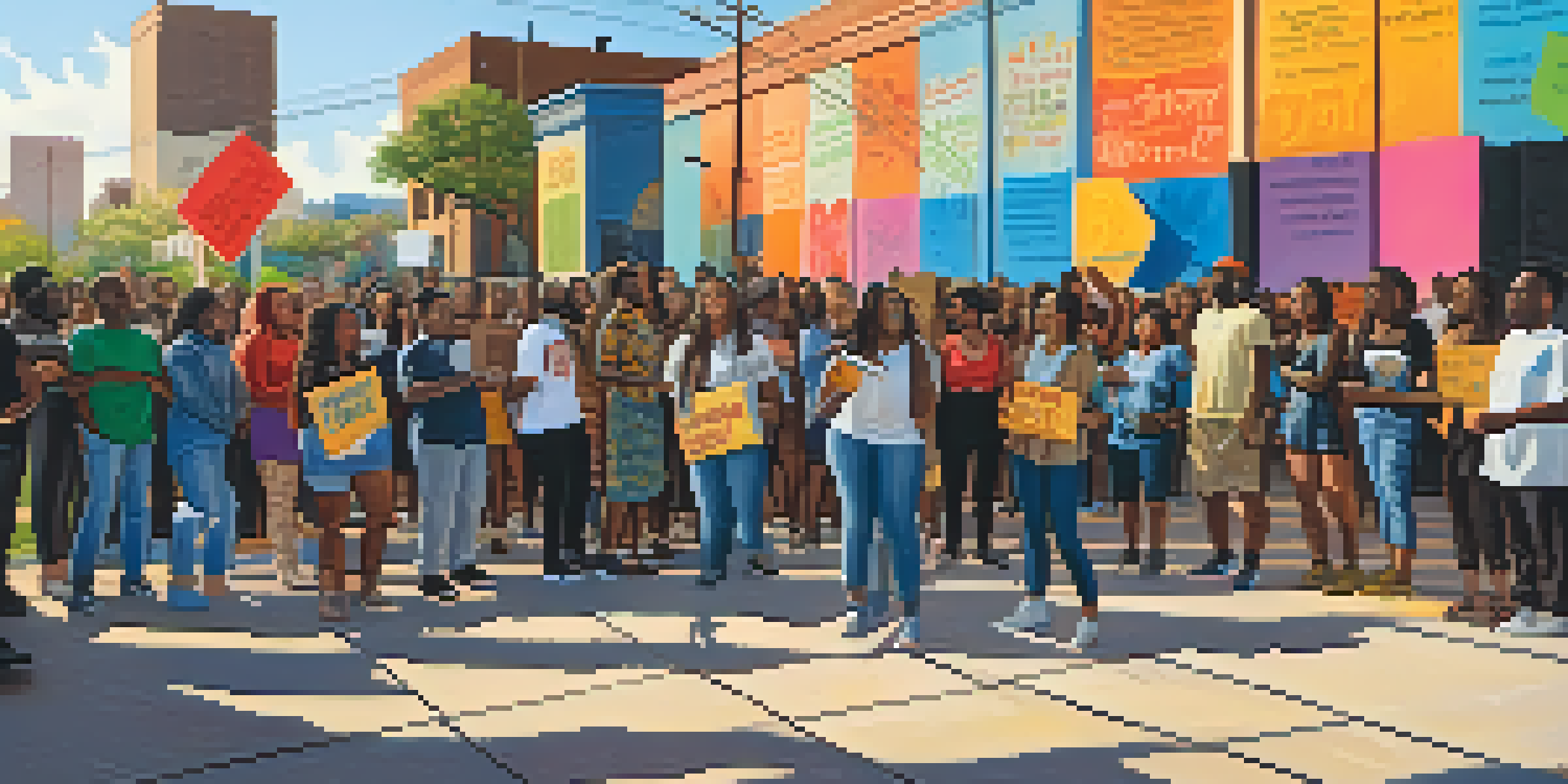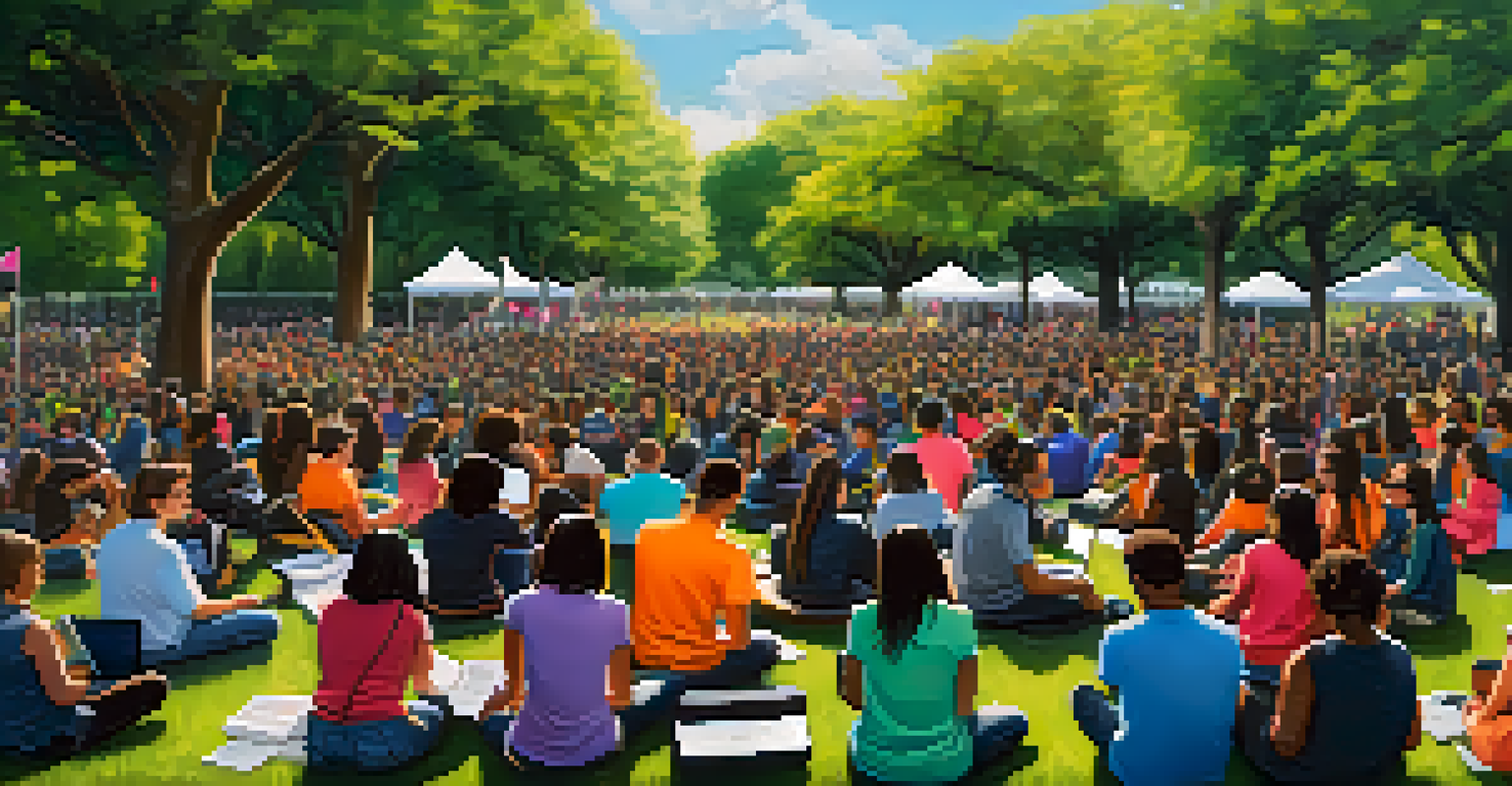Key Figures in Houston's Racial Justice Movements Today

Understanding Houston's Racial Justice Landscape Today
Houston's racial justice movements are vibrant and multifaceted, driven by a diverse range of voices. With a rich history of activism, the city has evolved, addressing systemic inequalities and fighting for marginalized communities. Today, grassroots organizations and community leaders are at the forefront, advocating for change and unity.
Injustice anywhere is a threat to justice everywhere.
The backdrop of these movements is Houston's unique demographic landscape, which includes a significant population of African Americans, Latinx, and other minority communities. This diversity enriches the conversation around racial justice, allowing for a variety of perspectives and experiences to shape the agenda. As we delve deeper, we will highlight key figures who embody this transformative spirit.
From advocating for police reform to tackling issues of economic injustice, the goals of these movements reflect the urgent need for equality. Understanding the individuals leading these efforts is crucial, as they provide the inspiration and momentum necessary for lasting change.
Tarsha Jackson: A Voice for Justice and Equity
Tarsha Jackson is a prominent figure in Houston's racial justice movements, known for her unwavering commitment to equality. As a community organizer, she has dedicated her efforts to addressing systemic issues that affect marginalized communities, particularly in the realms of education and housing. Her approach blends grassroots activism with policy advocacy, making her a powerful force in the fight for justice.

Jackson's work often involves mobilizing residents to participate in local government meetings, ensuring their voices are heard in policy discussions. By empowering community members, she fosters a sense of agency and ownership over their circumstances. This approach not only engages the community but also educates them about their rights and the importance of civic involvement.
Diverse Voices Drive Racial Justice
Houston's racial justice movements are fueled by a rich tapestry of voices advocating for systemic change and equality.
Through her initiatives, Jackson has successfully influenced legislation aimed at reducing disparities in education funding and affordable housing. Her ability to connect with people from all walks of life is a testament to her passion and dedication, making her a pivotal figure in Houston's ongoing quest for racial justice.
Dr. Robert Bullard: The Father of Environmental Justice
Dr. Robert Bullard, often referred to as the 'father of environmental justice,' is a key player in Houston's racial justice efforts. His groundbreaking work highlights the intersection of race and environmental issues, particularly how marginalized communities disproportionately bear the brunt of environmental hazards. As a scholar and activist, Bullard has been instrumental in raising awareness about these critical issues.
The time is always right to do what is right.
Bullard's research has shown that low-income neighborhoods, often inhabited by people of color, face higher exposure to pollution and toxic waste. By advocating for fair environmental policies, he emphasizes the need for sustainable practices that do not endanger these communities. His work serves as a crucial reminder that racial justice is deeply intertwined with environmental health.
Through numerous publications and public speaking engagements, Bullard continues to inspire a new generation of activists. His efforts not only foster a deeper understanding of environmental justice but also encourage collaborative actions towards a healthier, more equitable future for all Houstonians.
Karen P. Williams: Advocating for Police Reform
Karen P. Williams stands out as a leading advocate for police reform in Houston. As the founder of a local nonprofit focused on community policing, she works tirelessly to bridge the gap between law enforcement and the communities they serve. Williams believes that accountability and transparency are essential in rebuilding trust between the police and residents.
Her organization conducts workshops and forums aimed at educating the public about their rights when interacting with law enforcement. By promoting dialogue and understanding, Williams strives to empower citizens to advocate for their safety and rights. This proactive approach is essential in fostering a culture of respect and cooperation.
Youth Activism is Transformative
The rise of youth activism in Houston has invigorated efforts for racial justice, inspiring a multigenerational movement for change.
Williams has also been involved in policy discussions at the city level, pushing for reforms that promote equitable policing practices. Her relentless dedication to justice and community empowerment makes her a crucial figure in Houston's ongoing struggle for racial equality.
The Role of Youth Activism in Racial Justice
Youth activism has emerged as a powerful force in Houston's racial justice movements, with many young leaders stepping up to demand change. Inspired by recent global movements, local youth have organized protests, social media campaigns, and educational events to raise awareness about racial inequalities. Their energy and passion bring a fresh perspective to the conversation.
Organizations like the Houston Youth Collective play a vital role in nurturing this activism, providing resources and training for young leaders. By focusing on issues that resonate with their peers, these groups empower youth to take action and make their voices heard. This engagement fosters a sense of responsibility and community among the younger generation.
The impact of youth activism is evident as they mobilize their networks to advocate for policy changes and challenge systemic injustices. Their determination not only influences local policies but also inspires adults to join the cause, creating a multigenerational movement for racial justice.
Grassroots Organizations Making a Difference
Grassroots organizations are at the heart of Houston's racial justice movements, driving change from the ground up. Groups like Black Lives Matter Houston and the Texas Organizing Project are actively working to raise awareness about racial injustices and mobilize community members for action. Their efforts focus on creating a more equitable society by addressing systemic issues.
These organizations often host community forums, providing a platform for residents to voice their concerns and share their experiences. By building a strong community network, they empower individuals to engage in activism and advocate for their rights. This grassroots approach is crucial for fostering a sense of solidarity and collective action.
Social Media Amplifies Activism
Social media plays a crucial role in advancing Houston's racial justice movements by facilitating rapid communication and mobilization.
Through strategic campaigns and partnerships, grassroots organizations have successfully influenced local policies on issues such as police reform, affordable housing, and education equity. Their commitment to social justice not only addresses immediate concerns but also lays the groundwork for a more just and inclusive future.
The Impact of Social Media on Racial Justice Movements
Social media has transformed the way racial justice movements operate in Houston, providing a platform for activists to share their messages widely. Platforms like Instagram and Twitter have become vital tools for organizing protests, sharing information, and mobilizing support. This digital landscape allows for rapid dissemination of information, reaching audiences that traditional media may overlook.
Activists leverage social media to highlight issues of injustice, share personal stories, and call for community action. The ability to connect with others who share similar experiences fosters a sense of belonging and urgency. Additionally, social media campaigns can quickly gain momentum, sometimes leading to larger movements that transcend local boundaries.

While social media offers powerful opportunities for advocacy, it also comes with challenges, such as misinformation and echo chambers. Nonetheless, the impact of these platforms on Houston's racial justice movements is undeniable, as they continue to shape the narrative and engage a broader audience in crucial conversations.
The Future of Racial Justice Movements in Houston
As we look to the future, the momentum of racial justice movements in Houston shows no signs of slowing down. The collective efforts of activists, community leaders, and grassroots organizations continue to push for systemic changes that promote equity and justice. This ongoing commitment to advocacy is crucial in addressing the deep-rooted issues that persist in society.
The involvement of a diverse range of voices, including youth and those from marginalized communities, ensures that the movement remains inclusive and representative. Collaboration among various organizations will be essential to amplify their impact and create sustainable change. By working together, they can tackle complex challenges and drive meaningful progress.
Ultimately, the future of racial justice in Houston hinges on the persistence and resilience of its advocates. With the foundation laid by current leaders and the energy of new voices, there is hope for a more equitable and just society where all individuals have the opportunity to thrive.